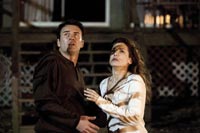So many movies scramble their chronology these days, it was only a matter of time before the characters within those movies began to get as confused as the audiences that watch them. Premonition stars Sandra Bullock as a woman whose week is thrown into chaos when she learns one day that her husband has been killed in a car accident, wakes up the next day to discover that he’s still alive, and then wakes up the next day to find that he’s dead again and everyone’s ready for the funeral.
It’s sort of like the exact opposite of what happened to Bill Murray in Groundhog Day—instead of waking up every day to find that she’s right back where she started, Bullock goes to sleep each night not knowing where or when the next day will begin. Fans might also wonder why Bullock is so attracted to such time-trippy stories; her last starring role was in The Lake House, a romance in which she swapped love letters with Keanu Reeves even though he lived two years in the past.

In some ways, Premonition is an improvement over that other film. For one thing, it follows the story’s internal rules more consistently, even if it never bothers to explain how Bullock’s character started hopping around in time in the first place; apparently, it’s just one of those things that happens to people sometimes, like spontaneous combustion or a bad hair day. Premonition is also grounded in a more interesting sort of relationship, at least to these eyes; what it depicts is a marriage in crisis, but the exact nature of that crisis seems to change over the course of the film.
At first, Bullock’s character, Linda Hanson, is simply stricken with grief over the loss of her husband, Jim (Fantastic Four‘s Julian McMahon). This part of the story is handled particularly well; first we see the silent routines that Linda keeps at home while the kids are at school and Jim is presumably away at work, and then we get a sense of how the house seems to become even more silent and more empty once the sheriff arrives with the news that her husband died the day before.

But it isn’t long before Linda suspects that she may have even bigger problems on her hands than her own widowhood; an unfamiliar woman (Amber Valletta) lurks on the fringes of Jim’s funeral ceremony, and one of Linda’s daughters, Bridgette (Courtney Taylor Burness), bears scars that no one can explain. Presumably she got those cuts on one of the days that Linda hasn’t experienced yet—but how?
The screenplay, by Bill Kelly (Blast from the Past), throws a number of red herrings into the mix, partly to keep us on our toes, but also to help us keep our bearings somewhat. Eventually, however, like many other time-travel stories, the film gets so caught up in its own cleverness that it threatens to turn into a game of “Can you predict how the later event that we have already seen will be set up by these earlier events?” (After, say, showing us a dead crow, the film deigns to show us how the crow died in the first place—but it doesn’t really matter to the story at all.)

Fortunately, Linda comes to recognize what is happening, and so she begins to fill in the blanks herself—quite literally—by drawing a chart and noting which days she has already experienced and which days are yet to come. (She assumes she will not experience any of them twice.) And as she resolves the mysteries that have turned up in her life, she ponders whether she ought to try to prevent Jim’s death. Is it “supposed” to happen? Does he “deserve” to die, even for things he hasn’t done yet? And would she be complicit in his death somehow if she doesn’t try to prevent it?
These are fun questions to consider, especially if you are a fan of movies that play with time and the nature of causality. But why is any of this happening to Linda, and where is it all going? On these two points, the movie falters.

After a psychiatrist (Peter Stormare) fails to answer her questions—indeed, we have reason to believe he will do her more harm than good—Linda consults a priest (Jude Ciccolella) she once knew to find out why her own personal timeline is so messed up, and he offers the bizarre theory that people who leave the church become “empty vessels” through which “unexplained phenomena” begin to express themselves. So is all of this a punishment from God? Or is all of this the work of untamed supernatural forces? Either way, if belief in God is supposed to protect people from this sort of thing, it is remarkable that Linda doesn’t seem to turn to him for help.
And where is this all going? Suffice to say the filmmakers work themselves into a bit of a corner, and the world depicted in this story owes more to the cruel, ironic fatalism of ancient Greek myths than it does to the liberating hope of the Christian gospel. And it doesn’t help that the positive elements that are there require us to overlook huge gaps in the narrative, both in terms of how Linda experiences the world around her, and in terms of the objective chronology in which everyone else lives. (I could say more, but it would mean getting into spoilers in a big way.)
Director Mennan Yapo, a German making his first English-language film, has a taste for the macabre that sometimes threatens to go over-the-top—a severed head rolling in the street, a swarm of insects packed inside a garbage bin and just waiting to be let out (but how did they get in there in the first place?), and so on. But for those who can get past the grim bits, Premonition has its merits, as a film about the need to love one’s spouse today, for you never know what tomorrow will bring.
Talk About It
Discussion starters- Do you believe the future is fated? Do you believe you would have the free will to change the future even if you could see it? How is prophecy treated in the Bible? When is the future set in stone, or open to change? (See 1 Samuel 23:7-13.)
- Linda wonders if Jim was “supposed” to die even if he hadn’t actually cheated on her yet. “Maybe the fact that he was intending to was enough,” she says. What do you think? Are intentions just as bad as actions? Is it possible to change a course of action before you actually do what you intended to do?
- Linda asks, “If I let Jim die, is that the same thing as killing him?” What do you think? Would it be wrong of her to accept Jim’s death before it happens?
- Do you think people face special dangers if they don’t believe in God? Does belief in God protect us from supernatural attack? Might it invite supernatural attacks?
- How should we understand “unexplained phenomena” in light of Christian faith? What “unexplained phenomena” have you encountered within the church?
The Family Corner
For parents to considerPremonition is rated PG-13 for some violent content (a fatal car accident, a girl cuts herself in another accident), disturbing images (a dead crow, a swarm of insects, a close-up on a needle being injected into somebody, a severed head falls out of a casket—though the latter bit is more suggested than shown), thematic material (discussions of possible marital infidelity, a scene of a married couple cuddling in bed after sex) and brief language (about half a dozen four-letter words).
Photos © Copyright Tristar Pictures
Copyright © 2007 Christianity Today. Click for reprint information.












